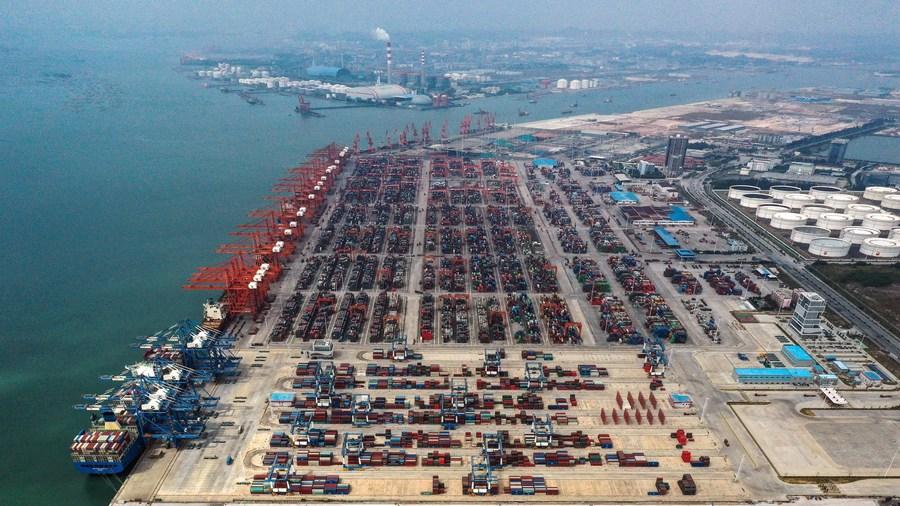In numbers: Why Chinese Dream matters to global economy

This aerial photo taken on Nov. 3, 2022 shows a view of Qinzhou Port in Qinzhou, south China's Guangxi Zhuang Autonomous Region. (Xinhua/Zhang Ailin)
BEIJING, Nov. 30 (Xinhua) -- A decade after the Chinese Dream of national rejuvenation was first put forward as a concept, China has taken great strides toward this goal, making unremitting efforts to build a great modern socialist country.
The development of the world's second-largest economy not only benefits China itself, but also injects a strong impetus into the global economy and provides enormous opportunities for the rest of the world.
Below are some key figures that show how China's remarkable achievements in the past decade play a positive role in the international economic landscape.
WORLD ECONOMY LOCOMOTIVE
China is moving toward its realization of the Chinese Dream. The country has maintained stable economic expansion over the past decade, making it a leading growth engine for the global economy.
The Chinese economy expanded at an average annual growth rate of 6.6 percent in the 2013-2021 period, a much higher rate than the global average of 2.6 percent and the developing economy average of 3.7 percent.
During this period, China's contribution to global economic growth averaged 38.6 percent, exceeding the combined contribution of the Group of Seven countries.
China's economic resilience was also seen in 2020, when it was the world's only major economy to register positive growth.
In 2021 alone, China's gross domestic product was 17.7 trillion U.S. dollars, accounting for 18.5 percent of the global total and up 7.2 percentage points from 2012.
A MAJOR IMPORTER
From toys and furniture to mechanical equipment and automobiles, China provides a variety of quality goods for the world while being the second-biggest importer among all countries.
China's combined foreign trade in goods hit 262.3 trillion yuan (about 36.4 trillion U.S. dollars) in the 2013-2021 period, rising at an annual growth rate of 5.4 percent. Imports climbed to 117.6 trillion yuan during the period, an annual growth rate of 4.7 percent.
China's imports contributed 13.4 percent of the world's import growth in 2021, vigorously promoting global economic recovery.
China's imports of consumer goods grew to 1.7 trillion yuan in 2021, more than double the 2012 figure, partly due to growing demand for premium products from the country's expanding middle-income group.
A robust increase in imports has not only helped improve Chinese people's livelihoods, but has also boosted growth and employment in export-oriented countries.
INDUSTRIAL CHAIN BUILDING
As the world's manufacturing powerhouse, China boasts the world's biggest and most complete industrial system, making it a key contributor to global industrial chains.
The global economy now faces multiple challenges, and China has offered solid support for both domestic and foreign companies, including support related to raw materials, production capacity, logistics and sales. By keeping its industrial chains resilient, China has helped ease the inflation pressure globally.
The added value of China's manufacturing sector overtook that of the United States for the first time in 2010, and has since ranked first globally. In 2020, Chinese manufacturing's added value accounted for 28.5 percent of the global total, up 6.2 percentage points from 2012.
Solid infrastructure is one of the factors behind China's industrial prowess. China has the world's largest 5G network, high-speed railway system and expressway network.
Efforts have also been made to advance technological innovation to facilitate an industrial upgrade. High-tech manufacturing accounted for 51.5 percent of the value of industrial exports from China's major companies, up 8.7 percentage points from 2012.
MAGNET FOR INVESTMENT
China has become an increasingly important destination for foreign direct investment (FDI), given its industrial strength, sound infrastructure and massive domestic market of 1.4 billion consumers.
FDI in the Chinese mainland, in actual use, climbed from 113.3 billion U.S. dollars in 2012 to 173.5 billion U.S. dollars in 2021, with an average annual growth rate of 4.8 percent.
China has shortened its negative list for foreign investment for five consecutive years, widening market access for foreign businesses in such areas as financial services, high-end manufacturing and electronic information.
In addition to attracting foreign investors, China has also encouraged domestic companies to expand internationally. China's outbound direct investment flows amounted to 1.4 trillion U.S. dollars from 2013 to 2021, an annual growth rate of 8.2 percent.
FREE TRADE ADVOCATE
On the way to realizing the Chinese Dream, China has undertaken win-win economic cooperation with the rest of the world by steadily opening its super-large domestic market and championing institutional arrangements that facilitate free trade.
In 2013, the first pilot free trade zone (FTZ) was established in Shanghai, serving as a testing ground for new trade policies and a platform for institutional opening up. To date, China has established 21 pilot FTZs across the country, making it easier for foreign businesses and their products to enter the Chinese market.
China has signed 19 free trade agreements with 26 countries and regions, up from 10 free trade pacts a decade ago. The trade volume between China and its free trade partners accounted for 35 percent of the country's total trade volume in 2021, a significant jump from 17 percent in 2012.
China has actively promoted the implementation of the Regional Comprehensive Economic Partnership, the world's biggest free trade deal, and is also seeking to join the Comprehensive and Progressive Agreement for Trans-Pacific Partnership and the Digital Economy Partnership Agreement to propel multilateralism and free trade further.
As China aims to increase its middle-income population to more than 800 million in the next 15 years, its growing free trade ties with the rest of the world, along with stronger domestic demand for quality international products, will create new opportunities for foreign businesses.
